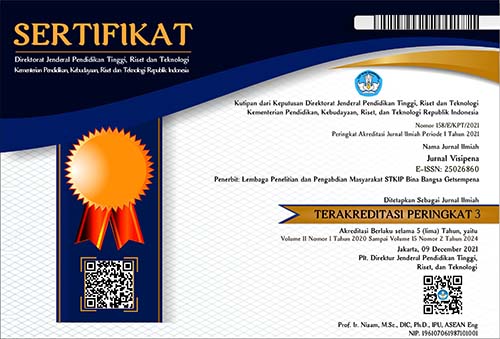TEACHING SPELLING THROUGH GAMES
Abstract
Games have been believed to be good media in assisting teaching for years. Games are believed can promote learning become more interesting. Many studies have been conducted on utilizing games in learning. Some have proved that games can catch students’ attention better than traditional media such as textbook. In this study, games were used in teaching students about spelling. Since spelling is the basic form of language, there are still contradicts in how to teach it better. The researchers believed that games can assist in enacting more interactive spelling course well. Thus, this research employed some spelling games to be used in teaching third grade students of English as a Foreign Language (EFL) Elementary school, Bungcala, Aceh Besar. The researchers wanted to know the students’ responses after teaching by using spelling games. Thus at the end of teaching and learning process after four meetings by applying games in teaching spelling, the researcher distributed questioners to students asking their opinion about spelling games in learning spelling. The students’ responses showed that they love to study spelling through games, games make them interested in studying spelling. Games let them work more in groups.
Downloads
References
Apel, K., Masterson, J. J., & Hart, P. (2004a). Integration of language components in spelling: Instruction that maximizes students’ learning. In L. Wilkinson (Ed.), Language and literacy learning in schools (pp. 292-318). New York, NY: Guilford.
Apel, K., Masterson, J. J., & Niessen, N. L. (2004b). Spelling assessment frameworks. In B. J. Ehren (Ed.), Handbook of language and literacy: Development and disorders (pp. 644-660). New York, NY: Guilford.
Bear, D. R., Invernizzi, M., Templeton, S., & Johnston, F. (2004). Words their way: Word study for phonics, vocabulary, and spelling instruction. Upper Saddle River: N.J.: Pearson Education Inc.
Cooke, N; Slee, J; Young, C. (2014). How is contextualized spelling used to Support reading in first-grade core reading programs? Reading Improvement. 51(4). 385-402.
Duke, N. K. (2016). What doesn’t work: Literacy practices we should abandon [Blog
entry]. Retrieved from https://www.edutopia.org/blog.
Ehri, L. C. (2000). Learning to read and learning to spell: Two sides of a coin. Topics in Language Disorder, 20, 19-36. doi:10.1097/00011363-200020030-00005
Ehri, L., &Wright, D. (2007). Beginners remember orthography when they learn to read Words: The case of doubled letters. Applied Psycholinguistics. 28. 115 133.
Ehri, L., Taylor, B., & Wilce, L. (1987). Children’s Categorization of Short Vowels in Words and the Influence of Spellings. Merrill-Palmer Quarterly. 33(3). 393 421.
Ehri, L., & Snowling, M. J. (2004). Developmental variation in word recognition. In C. A. Stone, E. R. Silliman, B. J. Ehren, & K. Apel (Eds.), Handbook of language literacy: Development and disorders (pp. 443-460). New York, NY: Guilford.
Effective Spelling Instruction Teaching Children How to Spell Helping Students Develop Spelling Skills. Retrieved from www.righttrackreading.com on June 15, 2017.
Fearn L., & Farnan, N. (2001). Interactions: Teaching writing and the language art. Boston: Allyn & Bacon.
Fernandes, B. E. (2017). Upper Elementary Teachers’ Self-Efficacy and Spelling Instruction: A Qualitative Study. Thesis. College of Professional Studies , Northeastern University, Boston, Massachusetts.
Henderson, E., & Templeton. (1986). A Developmental Perspective of Formal Spelling Instruction through Alphabet Pattern and Meaning. 86(3), 304-316.
Huyen, NTT, Nga, KTT. (2003). Learning vocabulary through games. Asian EFL Journal. 5(4), 90-105.
Jones, A. (1998). 104 Activities That Build: self esteem, teamwork, communication, anger management, self- discovery and coping skills. United States: Rec Room Publishing,Inc.
Joshi, R. M., Treiman, R., Carreker, S., & Moats, L. C. (2008-2009, Winter). How words cast their spell: Spelling is an integral part of learning the language, not a matter of memorization. American Educator, 6-16, 42-43.
Lovísa K., Laufey B., & Samúel L. (2006). Úttekt á enskukennslu ígrunnskólum[Rafræn heimild]. Reykjavík: Menntamálaráðuneytið. Sótt þann 19. Febrúar á slóð: http://bella.mrn.stjr.is/utgafur/enskuken sla.pdf
Moats, L. C. (2005-2006). How spelling supports reading and why it is more regular and predictable than you may think. American Educator, 12-21.
Palmer, J. L., & Invernizzi, M. (2015). No more phonics and spelling worksheets. Portsmouth, NH: Heinemann.
Pressley, M., Rankin, J., & Yokoi, L. (1996). A survey of instructional practices of primary teachers nominated as effective in promoting literacy. The Elementary School Journal, 96(4), 363-384. Retrieved from http://www.jstor.org.
Reece, C., & Treiman, R. (2001). Children’s spelling of syllabic /r/ and letter-name vowels: Broadening the study of spelling development. Applied Psycholinguistics, 22, 139-165.
Schlagal, B. (2002). Classroom spelling instruction: History, research, and practice. Reading Research and Instruction, 42(1), 44-50.
Sigurðardóttir. S.D. (2010). The use of games in the language classroom. Háskóli Íslands Menntavísindasvið Kennaradeild, grunnskólakennarafræði.
Singer, R., & Bashir, A. (2004). Developmental variations in writing. In C. A. Stone, E. R. Silliman, B. J. Ehren, & K. Apel (Eds.), Handbook of language literacy: Development and disorders (pp. 559-582). New York, NY: Guilford.
Silliman, E. R., Bahr, R. H., & Peters, M. L. (2006). Spelling patterns in preadolescents with atypical language skills: Phonological, morphological and orthographic factors. Developmental Neuropsychology, 29, 93-123.
Snow, C. E., Griffin, P. L., & Burns, M. S. (Eds.). (2005). Knowledge to support the teaching of reading: Preparing teachers for a changing world. San Francisco, CA: Jossey-Bass.
Sugar, S. (1998). Games That Teach. San Francisco: Jossey-Bass Pfeiffer.
Wright, M., Vogel, J.J., Vogel, S.D., Bowers, J., Bowers, C.A., & Muse, K. (2006). Computer Gaming and Interactive simulation for learning: A Meta Analysis. Journal of Educational Computing Research, 34 (3). 229-243.





















